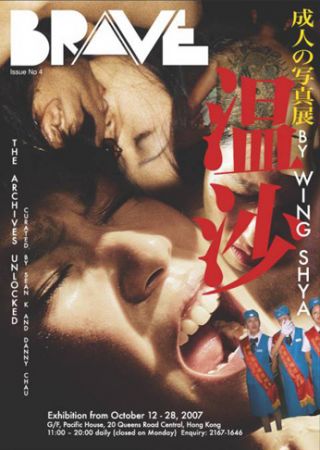 Note: This post is part of an extended auto-biography which is collected in my About page.
Note: This post is part of an extended auto-biography which is collected in my About page.
As our first China company, Xiaban.com, transitioned to becoming the local BBS web site, XMFish.com, my business partner Patrick Lee and I decided that we would pursue new opportunities that would allow us to return to my original passion of film and entertainment and to move to Hong Kong. We had witnessed how the social network Myspace had grown leaps and bounds faster than our former acquirer IGN Entertainment despite being acquired at the same time and for around the same amount of money and by the same owner, News Corporation. As a consequence, we partnered with the members of band Alive to create a new online community of artists, alivenotdead.com.
Patrick had been the primary investor and executive producer for the directorial debut of popular Hong Kong-based actor Daniel Wu (吴彦祖), The Heavenly Kings (四大天王). During college, Daniel was the co-founder of the University of Oregon Wushu Team and frequently came down to Berkeley, near his original hometown, to practice with us and Cal Wushu Team. Daniel and another Cal classmate of ours, Terence Yin (尹子维), were now successful actors in Hong Kong and presented Patrick with the idea of doing creating a boy band similar to F4 or the Backstreet Boys comprised of popular Hong Kong heartthrob actors. In reality, the boy band, named “Alive” and additionally comprising of actors Andrew Lin (连凯) and Conroy Chan (陈子聪), was a cover for a mock-umentary that they were filming that would expose some of the hypocrisies and urgent issues in the Asian entertainment industry. For a period of a year and a half, Alive recorded and released several songs and even went out on a concert tour throughout Asia in the guise of a boy band when, in reality, they were documenting the process for their film. When finally released during the Hong Kong International Film Festival in April 2005, the film and the fake band’s secret mission landed as a media bombshell (The Standard (HK), San Francisco Chronicle), but eventually went on to earn Daniel the award for Best New Director at the Hong Kong Film Awards.
Alivenotdead.com was the original web site for the Alive band and, eventually, The Heavenly Kings movie. It was created by the Alive boys as a place for fans to read their updates as well as connect with other fans on the site’s message boards. It also hosted fan boards for several of the independent Hong Kong bands that were featured in the movie and had accumulated an impressive 30,000+ registered members. As the promotion for the film was coming to an end, the Alive boys presented Patrick with the idea of converting the web site and it was eventually we came across the idea of building an online community similar to Myspace that would allow artists to connect with their fans. Patrick and I were primarily interested in returning to something entertainment-themed as this was my original passion; additionally, we wanted to pursue a model that could grow exponentially as Myspace had, but do it in Asia. Daniel and Terence sought to build a community that could support and largely run artists including filmmakers, musicians, and others.
As a consequence, we worked through early 2007 to launch a new alivenotdead.com in April 2007 with seven initial “official artists”: the Alive band, Daniel Wu (吴彦祖), Andrew Lin (连凯), Conroy Chan (陈子聪), Terence Yin (尹子维), world-famous Chinese action star Jet Li (李连杰), and Chinese-American actress Kelly Hu (胡凯莉). Jet and Kelly came on-board as initial artists on the site since we had been doing their official web sites for numerous years already extending back to our Design Reactor days.
The official artist membership rapidly expanded from the initial seven artists to it’s current roster of around 1,600 artists (as of January 2011) with primary coverage in Hong Kong, Singapore, mainland China, Taiwan, Japan, and Asian-Americans in the United States. Artists can publish and share blogs, photo albums, events, and maintain their own fan forums. For a while, we experimented with artist stores that allowed artists to sell merchandise directly from their profiles. Fans can also register and create their own blogs, photo albums, etc. and connect with their favorite artists and as of January 2011 we have over 600,000 registered members.
A lot of the work we’ve done recently on Alive Not Dead has been towards connecting artists with each other as well as with advertising brands as a way to generate revenue. With the financial crisis in 2008, we pivoted to expand our efforts on working with artists and advertisers on offline events in conjunction with online advertising. At the current time, we work with many top brands (e.g. Adidas, Nokia, Esprit, Diesel) to create online marketing campaigns that draw attention to artist concerts, art exhibitions, etc. which employ Alive Not Dead artists. We also host the most popular and fun annual, costumes-mandatory Halloween party (“Dead Not Alive” Halloween 2010, 2009 (another link), and 2008) in Asia 🙂 .
Working closely with artists, we’ve also expanded our alivenotdead.com platform to help some high profile Asian artists power their official web sites. We power the official web sites for Jet Li 李连杰 (JetLi.com), Jackie Chan 成龙 (JackieChan.com), and Karen Mok 莫文蔚 (KarenMok.com).
In October 2009, I decided to move from Hong Kong to Beijing in order to accelerate our expansion in mainland China. I personally wanted to return to mainland China where I had moved originally when I first came to Asia, and especially to Beijing which is the epicenter of the unique and tremendous internet industry in China. Additionally, Alive Not Dead had recently landed a partnership with web portal, Tom.com, that would allow us to begin hosting and promoting the alivenotdead.com community within mainland China with the help of a local partner. Since then, I’ve been working to reach out to other internet entrepreneurs and engineers, improve my Mandarin Chinese, and grow an online destination for a local Chinese audience.
Update: After departing Alive Not Dead in April 2013, the company was acquired by the Southeast Asian social networking company Migme in early 2014. Alive Not Dead continues to grow under Migme’s stewardship.













